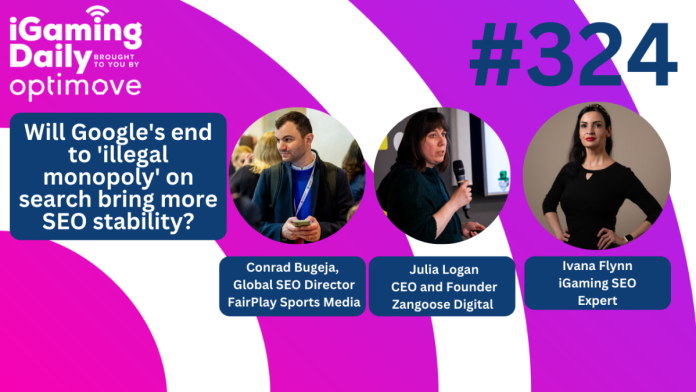Google’s decade of SEO dominance may be ending after the tech giant was found to have violated US antitrust laws with its search business. US District Judge, Amit Mehta, ruled that Google ‘is a monopolist, and it has acted as one to maintain its monopoly’ following the decision by the US District Court for the District of Columbia.
On the latest episode of iGaming Daily, SEO Expert, Ivana Flynn, was joined by the CEO and Founder of Zangoose Digital, Julia Logan, and Conrad Bugeja, the Global SEO Director at FairPlay Sports Media, to discuss the news and how it could impact the gambling SEO sector.
Google has been fined following several European lawsuits, however, Julia described the US ruling as the “biggest and most important” as it is “an official declaration that Google is a monopoly”.
She added: “I’ve been saying for a while that we should stop ignoring other options, and primarily Bing. Bing has been making progress recently and its share of the market has been growing so I just hope that this will give them some chance to grab a bigger share of the market.
“We need an alternative with a proper market share. Google has only been a monopoly for the last 15 years perhaps. Before that, we had a situation where there were multiple search engines. I think it was [better] because as users we had a better choice and the search engines had the incentive to improve and grow. I think with Google being a monopoly, they became insensitive to the need to innovate and keep the user’s interest in mind.”
Mehta’s decision is expected to trigger a separate proceeding to determine what penalties Google will face, however, this may take months or years for the consequences to pay out given Google’s plans to appeal the ruling.
If upheld, the decision could change how Google makes its search engine available to users, including mandating that Google implement a “choice screen” that informs users of other available search engines.
The potential changes will also have an impact on how SEO professionals operate, and the trio discussed how the role of SEO could change as the focus shifts to a wider range of search engines.
“Don’t forget that SEO means search engine optimisation, not just Google optimisation,” explained Julia. “I would say it’s long past time for all the SEO tools to start working with data from other sources, not just Google.
“It used to be the case that all the tools included MSN, Yahoo and Google. Then they just dropped the others. We had to deal with a bunch of search engines with very complex relationships and it used to change all the time. It was great, it made life interesting and it gave us some alternatives.”
In light of the decision, as well as the rise of alternatives such as ChatGPT’s recently launched SearchGPT, the show ended with the guests considering how searching the internet may change in the coming years,
Conrad said: “I think Google is still going to be a strong player in the market and I see them for now still having the strongest product.
“There are a lot of spenders and a lot of information. We need to keep in mind that we need to diversify traffic and how this will change. I think there will be different entry points for users to search in the future.”
Ivana added that “disruption is always good for growth” and she believes that SEO specialists will become “more in-demand as there will be more to optimise” in the future.





